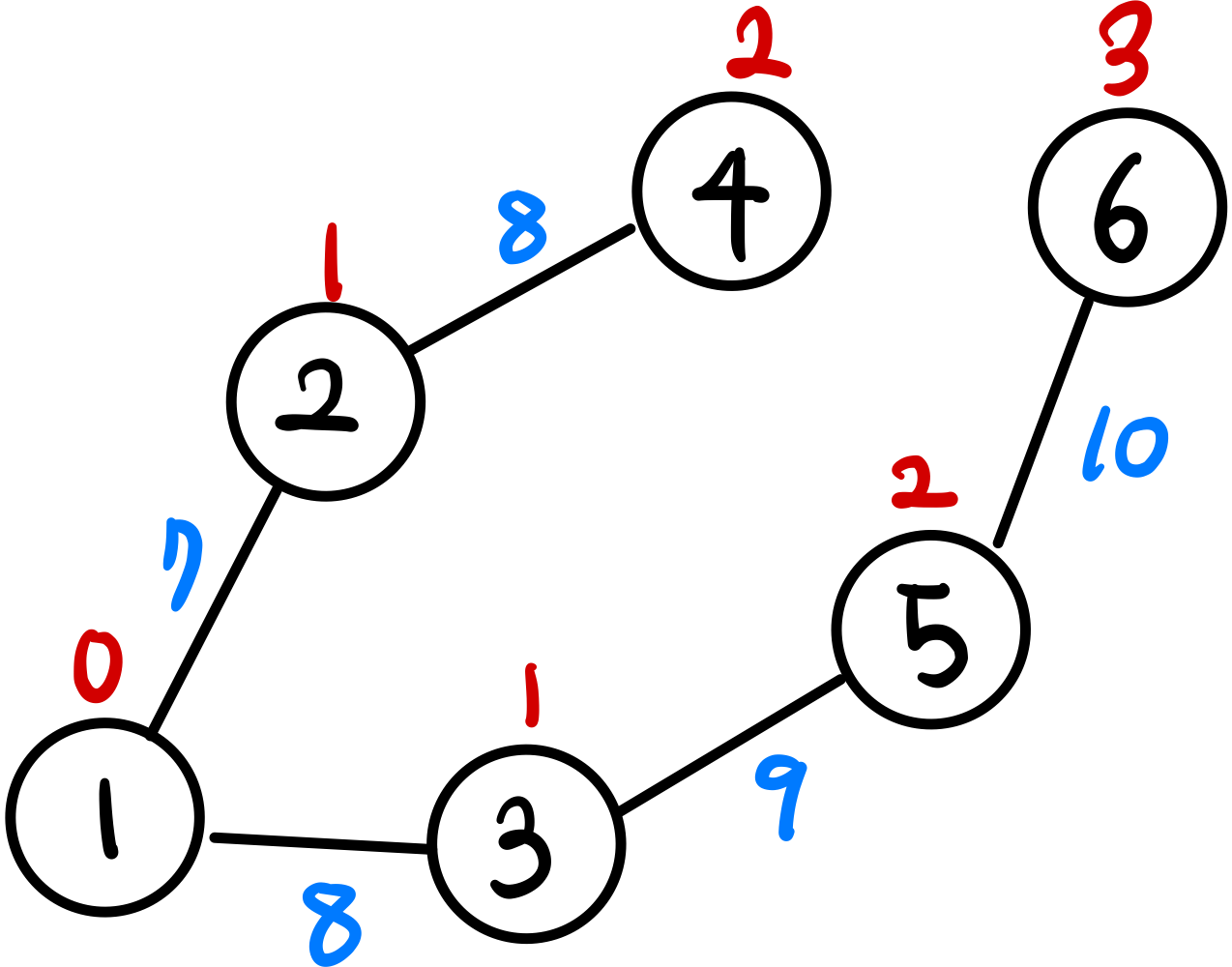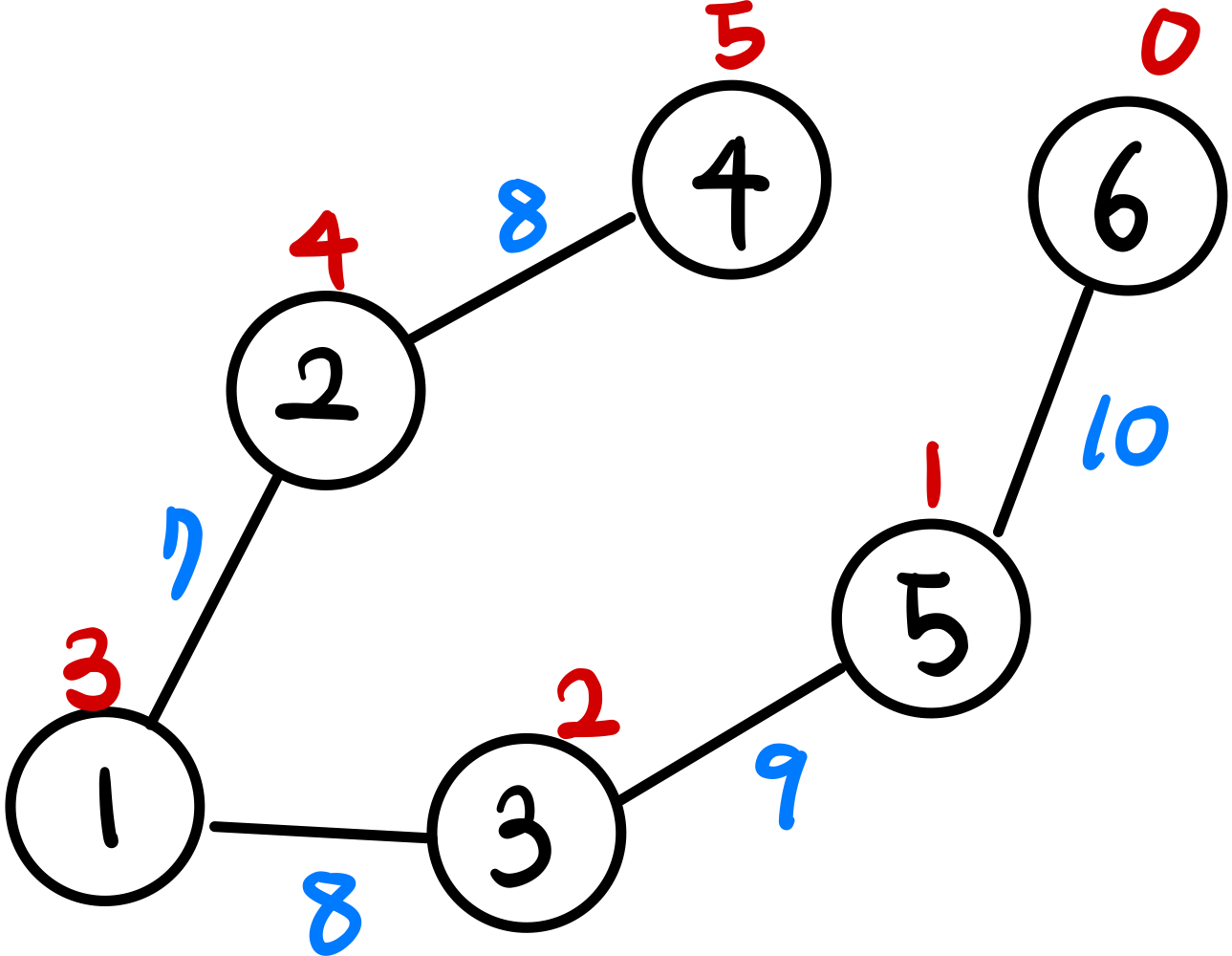백준 이상적인 경로(3526)
1. 힌트
1) 사전순으로 가장 앞선 경로를 찾으려면 번 방에서 시작해서 언제나 가장 사전순으로 작은 간선만을 이용하면 됩니다.
2) 동시에 최단경로여야 하므로 최단 경로에 속하는 정점으로만 이동해야 합니다 번 정점에서 거꾸로 BFS를 해서 dist배열을 완성한 뒤 dist[here] - 1 = dist[there]인 경우 there은 최단 경로가 지나는 정점임을 알 수 있습니다.
3) BFS를 통해 이상적인 경로를 역추적하는 과정에서 간선을 확인하면서 가장 작은 가중치의 간선을 모두 Queue에 넣습니다. 이러한 간선은 여러개가 있을 수 있습니다.
2. 접근
1) 최단 경로
의 최단 경로의 길이는 간선의 가중치를 무시하고 단순하게 BFS를 통해서 구할 수 있습니다. 그런데 최단 경로이면서 동시에 사전순으로 가장 앞서는 경로는 어떻게 찾을 수 있을까요? 만약 최단 경로임을 고려하지 않는다면 언제나 사전순으로 가장 앞서는 간선만 이용하면 사전 순으로 가장 앞선 경로를 찾을 수는 있습니다. 그런데 이건 최단 경로는 아니죠.
2) 역추적

6 5
1 2 7
2 4 8
1 3 8
3 5 9
5 6 10
=>
3
8 9 10빨간색은 번 정점에서 시작한 BFS의 dist배열을 나타내고 파란색은 간선의 가중치를 의미합니다. 이상적인 경로를 찾기 위해서는 최단 경로에 속하면서 사전순으로 가장 앞선 경로로만 이동해야합니다. 최단 경로가 지나는 정점인지 쉽게 알 수 있는 방법이 있습니다.

바로 번 정점에서 BFS를 시작해서 dist배열을 만드는 것입니다. dist[here] - 1 = dist[there]이라면 there정점으로 이동하면 언제나 최단경로임을 보장할 수 있죠. 단, 이러한 최단 경로가 여러 개 있는 경우는 모두 이동해봐야합니다. 따라서 사전 순으로 가장 앞서는 길이가 인 경로, 인 경로 ... 순으로 BFS를 이용해서 역추적합니다.
3. 구현
public class Main {
static int N;
static ArrayList<ArrayList<Pair>> adj;
static int[] dist;
static void bfs(StringBuilder bw) {
Queue<Integer> q = new LinkedList<>();
q.offer(N);
dist = new int[N + 1];
Arrays.fill(dist, -1);
dist[N] = 0;
while (!q.isEmpty()) {
int here = q.poll();
for (Pair p : adj.get(here)) if (dist[p.index] == -1) {
int there = p.index;
q.offer(there);
dist[there] = dist[here] + 1;
}
}
bw.append(dist[1]).append("\n");
}
static void construct(StringBuilder bw) {
Queue<Integer> q = new LinkedList<>();
q.offer(1);
boolean[] booked = new boolean[N + 1];
booked[1] = true;
while (!q.isEmpty()) {
int size = q.size();
// 사전순으로 가장 작은 가중치를 구한다
int min = Integer.MAX_VALUE;
for (int i = 0; i < size; i++) {
int here = q.poll();
for (Pair p : adj.get(here)) {
int there = p.index;
if (dist[here] - 1 == dist[there]) {
min = Math.min(min, p.value);
}
}
q.offer(here);
}
if (min != Integer.MAX_VALUE) bw.append(min).append(" ");
// 사전순으로 가장 작은 가중치를 갖는 간선이 여러개라면 모두 방문
for (int i = 0; i < size; i++) {
int here = q.poll();
for (Pair p : adj.get(here)) {
int there = p.index;
if (p.value == min && !booked[there] &&
dist[here] - 1 == dist[there]) {
q.offer(there);
booked[there] = true;
}
}
}
}
}
public static void main(String[] args) throws IOException {
BufferedReader br = new BufferedReader(new InputStreamReader(System.in));
StringBuilder bw = new StringBuilder();
StringTokenizer st = new StringTokenizer(br.readLine(), " ");
N = Integer.parseInt(st.nextToken());
int M = Integer.parseInt(st.nextToken());
adj = new ArrayList<>();
for (int i = 0; i <= N; i++) adj.add(new ArrayList<>());
for (int i = 0; i < M; i++) {
st = new StringTokenizer(br.readLine(), " ");
int a = Integer.parseInt(st.nextToken());
int b = Integer.parseInt(st.nextToken());
int c = Integer.parseInt(st.nextToken());
adj.get(a).add(new Pair(b, c));
adj.get(b).add(new Pair(a, c));
}
for (int i = 0; i <= N; i++) Collections.sort(adj.get(i));
bfs(bw);
construct(bw);
System.out.println(bw);
}
}
class Pair implements Comparable<Pair> {
int index, value;
Pair(int i, int v) { index = i; value = v; }
@Override
public int compareTo(Pair o) { return value - o.value; }
}
1) 시간 복잡도
모든 정점은 Queue에 단 한번만 들어가므로 BFS와 동일하게 입니다.
2) 테스트 케이스
6 5
1 2 7
2 4 8
1 3 8
3 5 9
5 6 10
=>
3
8 9 10